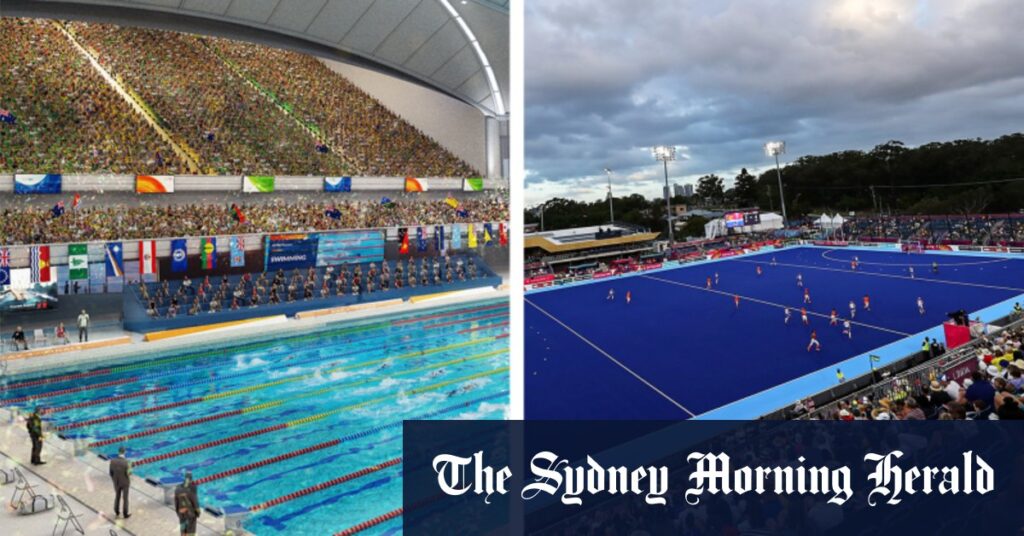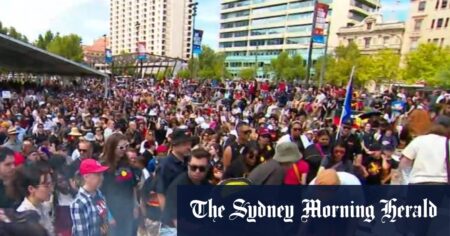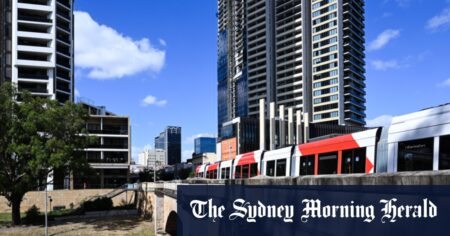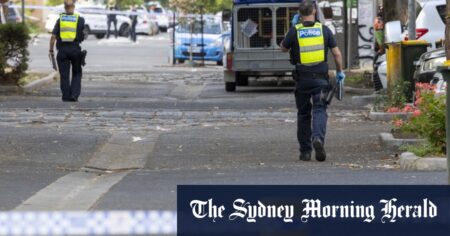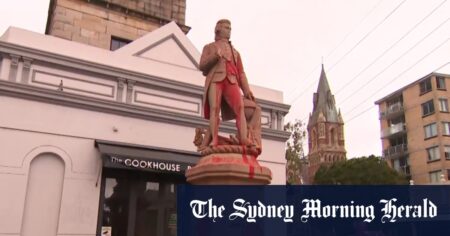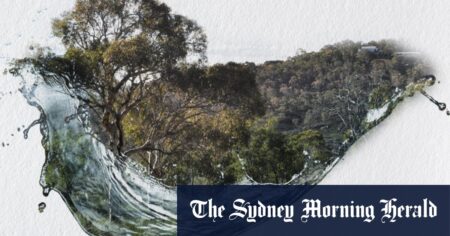Olympic sports are scrambling for their own Brisbane 2032 legacy facilities, with hockey, swimming and other aquatic sports rejecting initial plans for temporary competition venues for their events.
As it stands, hockey is to be played at Ballymore, the home of Queensland rugby union, while swimming competition is to be held in a drop-in pool at the planned Brisbane Arena.
Neither venue would leave the sports, in which Australia has a proud Olympic history, with a lasting legacy from the Brisbane 2032 Olympic and Paralympic Games.
In their submission to the Games Independent Infrastructure and Coordination Authority’s 100-day infrastructure review, the four major aquatic sporting bodies – Swimming Australia, Diving Australia, Water Polo Australia and Artistic Swimming Australia – argued for a new $650 million aquatic centre to be built at Victoria Park.
Hockey, meanwhile, has pushed for Olympic competition to be moved from Brisbane to the Gold Coast.
The current Games master plan has hockey being played at Ballymore on drop-in pitches, which HQ and HA describe as “a short-term solution that does not deliver any meaningful infrastructure or legacy benefits for community hockey or high-performance hockey”.
It is a proposal Hockey Australia has long opposed.
“[Ballymore] is costlier than building a new synthetic pitch, with estimates indicating an additional $1 million-$1.5 million in costs for the temporary solution (not including the cost of returning Ballymore to a rugby pitch),” the two sporting bodies write in their submission.
“[It] fails to deliver a sustainable legacy, leaving Queensland without a suitable venue to support hockey’s future participation and high-performance pathways. As a result, the current Games Venue Master Plan offers no legacy or generational outcomes for hockey.”
Hockey does not want its Olympic competition to be held at Ballymore.Credit: Matt Dennien
A temporary hockey venue at Ballymore should only be considered, they say, “if it is accompanied by a commitment to building a legacy hockey facility for Brisbane”.
Hockey Queensland chief executive Alison Lyons said the sport was blindsided by the 2021 announcement that Olympic hockey would be held at the Herston rugby venue.
Lyons said hockey had concerns about potential flooding, along with Ballymore’s general suitability to host the sport at that high level.
“We have been advocating for legacy for Brisbane since the announcement of 2032 and the announcement that Ballymore – the mud pit – would become the hockey venue,” she said.
“That decision was made without any consultation with Hockey Queensland.
“We were taken by surprise that that was where hockey was going to be played, and so then we took it upon ourselves to demonstrate to government that there was actually a need for infrastructure within Brisbane.”
That led to HQ publishing its Hockey Major Infrastructure Feasibility Study last year, which identified the Boondall Entertainment Centre grounds as a potential new home for the sport.
“We weren’t getting a lot of positive feedback from the state government or Brisbane City Council at the time and then, when the terms of reference were released, we had to really consider what were our best options,” she said.
“Because when the terms of reference talked about leveraging current infrastructure, transport connectivity, and within the funding envelope, building a new facility or even upgrading the State Hockey Centre [at Colmslie] didn’t meet those terms of reference.
“Our number one goal, though, is not to be at Ballymore and have temporary infrastructure. So for us, the Gold Coast became the best option to host the Games under those terms.”
The proposed venue at Labrador’s Gold Coast Hockey Centre hosted the men’s and women’s competitions during the 2018 Gold Coast Commonwealth Games.
In their submission, HA and HQ say the Gold Coast would be the most cost-effective option for Olympic hockey.
Importantly for the hockey, it would leave a legacy for the sport beyond 2032.
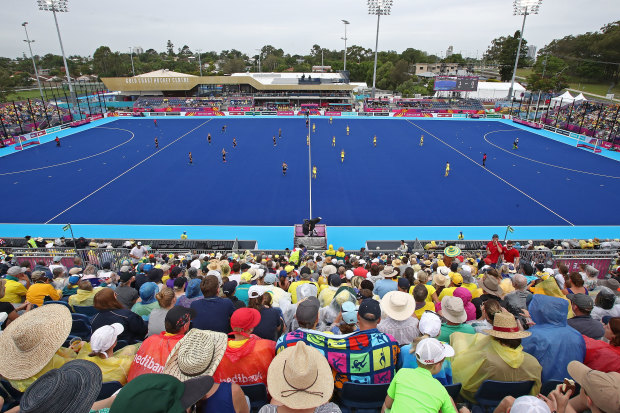
The Gold Coast Hockey Centre during the 2018 Commonwealth Games.Credit: Scott Barbour/Getty Images
“The GCHC requires limited upgrades to achieve international certification and meet the required broadcast standards,” they said.
“With an athletes’ village already slated for construction at Robina, this approach will ensure the hockey athletes’ experience, including village life, remains comparable with the Brisbane hub, thereby preserving the essence of the Olympic experience.
“Finally, throughout the 2018 Commonwealth Games, the GCHC venue demonstrated it can and does present hockey in a visually and aesthetically engaging way to elevate the sport’s profile globally during the Olympics.”
The centre would need an additional synthetic turf pitch.
“Importantly, the [Gold Coast City Council] has committed to funding any required upgrades on a 50/50 basis,” they say.
The need for legacy in Queensland, HA and HQ argue, is clear.
“Queensland has a long history of producing elite hockey talent, with 66 Olympians and 190 national representatives who have played for the Hockeyroos and Kookaburras,” they say in their submission, referring to the women’s and men’s national teams.
Lyons said a new or upgraded 5000-capacity venue was needed, with room to expand to 10,000 through temporary seating.
Loading
“We want to be able to host a World Cup in the lead-up to 2032,” she said.
“There’s a World Cup in 2030 that we think the Gold Coast and Queensland could be best placed to host for teams wanting to be here before the Olympics.
“That is an incredible revenue generator in terms of sports tourism and presenting Queensland to the rest of the world. Hockey is in the top 10 global participation sports, so we’re reaching a wide number of people to encourage them to come to Queensland for the games or for anything else.”
Hockey made its case to the GIICA review panel in person last Thursday.
Regardless of the outcome, Lyons said after having had no input in the initial Ballymore decision, the 100-day review experience had been refreshing.
“We were really grateful to finally have this conversation, because we’ve been wanting to have this conversation for the last three years,” she said.
“Even in the 60-day review process, where we put in a submission, hockey didn’t fit the terms of reference for that because it wasn’t looking at temporary infrastructure.”
Similarly to hockey, the national sporting bodies for swimming, diving, water polo and artistic swimming – backed by the Australian Olympic Committee and Paralympics Australia – are backing a permanent legacy from Brisbane 2032.
The aquatic sports are jointly pushing for a new aquatic centre at Victoria Park, which would seat 8800 over two arenas – expanding to 25,800 in Games mode. The main pool would have a Games capacity of 19,000.
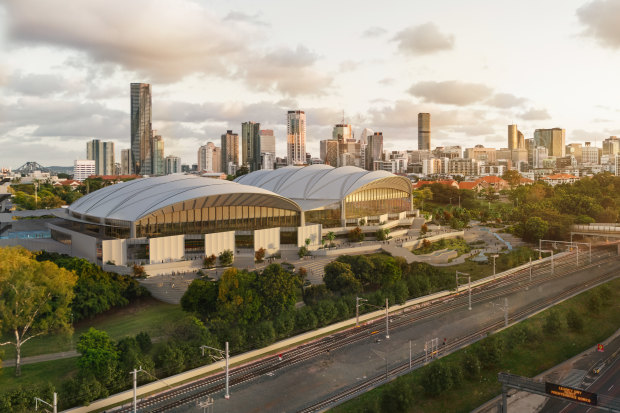
Render of the proposed National Aquatic Centre at Victoria Park. Credit: Archipelago
All four of the sports bodies highlighted the need for a permanent legacy for their sports from Brisbane 2032, rather than a drop-in pool at a new multi-purpose arena.
Designed by Archipelago, the Brisbane architecture firm behind the Brisbane Bold Victoria Park stadium concept, the new aquatics centre would be built at the site of the existing Centenary Pool.
Both would have large indoor pools that would become the national base for the four peak aquatic sports.
Swimming Australia chief executive Rob Woodhouse said the 2032 Games were a “generational opportunity” to build a new National Aquatics Centre that would feature a main and secondary stadium.
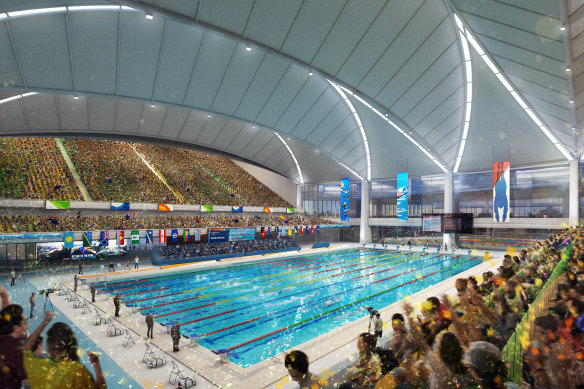
The main pool would hold 19,000 in Games mode.Credit: Archipelago
“We have needed an upgraded aquatic sport venue, not just for elite sport and competition but to service our diverse community in what is uniquely built into the Australian fabric – a love of water,” he said.
“This proposal is because we don’t want to miss the opportunity to create a legacy with the Games in our backyard. It’s a facility that will bring together the community with learn-to-swim, educate people from all backgrounds on the skill of swimming, and will discover new talent.”
Loading
Diving Australia chief executive Alex Newton said Queensland’s facilities did not meet the sport’s growing demand.
“Even without the Olympics, there are not enough diving facilities in Australia to support the ever-growing community of divers, from young participants wanting to give the sport a go through to growth among masters’ competitors,” he said.
Last week, architects Richard Groves and Bates Smart released their vision for a new national aquatics centre to be built atop the Mount Coot-tha quarry.
Read the full article here







